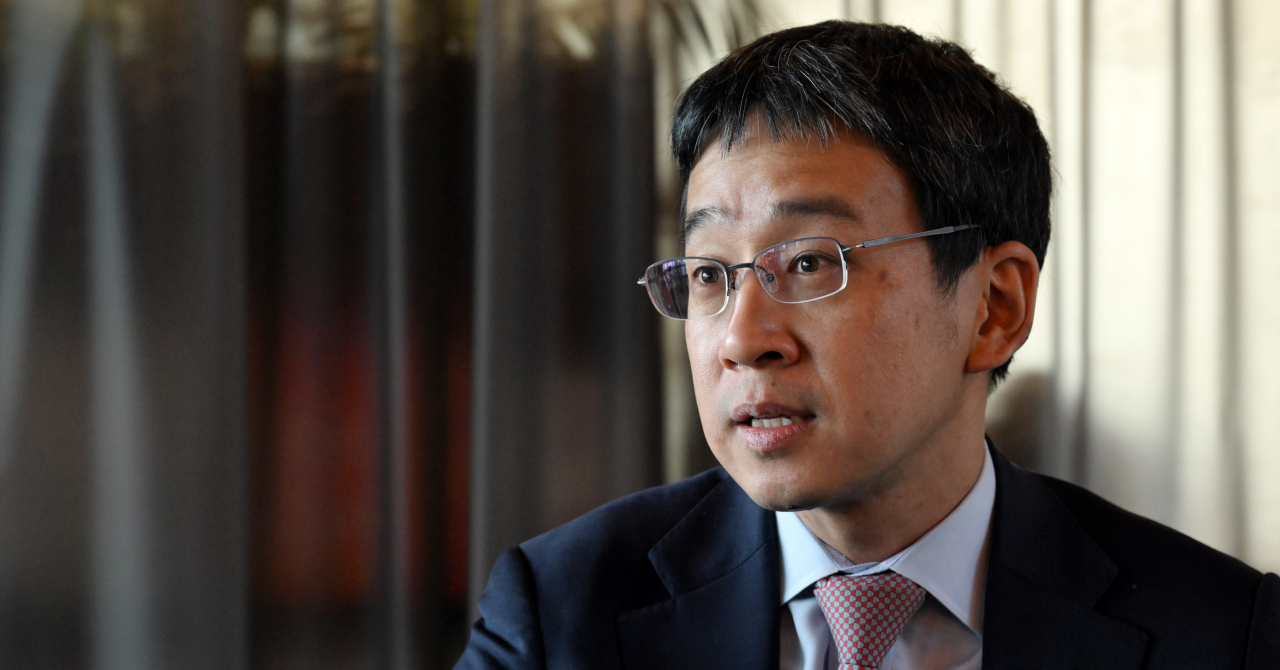 |
Solutions for Our Climate head Kim Joo-jin poses for a photograph on the rooftop of the Heyground building in Seoul, where his NGO is located. (Park Hae-mook/The Korea Herald) |
When Kim Joo-jin joined a small environmental club at Seoul National University, he had no idea it would reshape his life. From pursuing a career in law to founding an environmental non-profit organization, every step he took was fueled by the passion he discovered in his early 20s.
He is now the founder of Solutions for Our Climate, an independent policy research and advocacy organization that advises and pressures policymakers and financiers to phase out fossil fuels, end coal financing, and support renewable energy development.
In over eight years since its inception, the organization has halted approximately 4,000 megawatts of coal power projects across Korea, Indonesia, the Philippines and South Africa. It has accelerated the retirement of 8,000 megawatts of domestic coal capacity by at least 10 years. The organization also played a key role in canceling Gunsan Bioenergy, a proposed 200-megawatt biomass power plant, which would have been one of the largest in Korea.
“It all began when I joined the wrong club in college,” said Kim at his office in Seoul in an interview with The Korea Herald. He joined the club by chance, but it sparked his interest in environmental issues.
The club had been formed a decade earlier to address social issues, and was primarily political. By the time Kim joined shortly after the 1997 adoption of the Kyoto Protocol, which aimed to reduce greenhouse gas emissions, the members had shifted toward environmental concerns.
“It was not like we formally studied environmental science. Seniors lent me books like Silent Spring by Rachel Carson or Hayao Miyazaki’s manga, which were environment-themed,” he said. “Those were my introduction to environmental issues.”
As his passion for environmental issues grew, so did his dedication to protecting the Earth. His focus soon turned to Gwanaksan, the mountain encircling his campus. He became conscious of the relentless construction of new buildings on campus.
“Now, I understand those buildings were intended to provide study spaces for students. But at the time, I was young and concerned about the impact on the mountain’s ecosystem. I felt a strong need to protect it,” he recalled.
His protests at the university office led to a harsh reality check. “They explained the complexities of the laws mandating construction in those areas. I realized I had no understanding of how society worked and felt insignificant. I learned that effecting change requires more than just passion.”
After becoming a lawyer, he joined Kim & Chang, Korea’s largest law firm. He volunteered for environmental law cases while many of his peers gravitated toward fields like antitrust or mergers and acquisitions. Because few lawyers were interested in environmental law, he found himself with numerous opportunities to engage in cases related to environmental and energy issues. His work included legal disputes related to the construction, sale and purchase of coal, gas, wind and solar power plants, as well as cases involving shipbuilding firms constructing oil drilling vessels.
Defending clients, who often operated in ways that conflicted with environmental interests, rarely caused him inner turmoil. “I realized that many cases weren’t black-and-white. Clients usually had legitimate reasons for their actions, which helped me gain a deeper understanding of the economy and corporate decision-making.”
After eight years in a high-paying law career, he decided to leave it behind for environmental activism, a choice driven by several “eye-opening” moments.
In 2009, he visited the United Nations Climate Change Conference in Copenhagen. There, he witnessed firsthand the powerful role that private NGOs played in spearheading climate initiatives -- an approach that was largely absent in Korea. Inspired by organizations like the Natural Resources Defense Council, Kim recognized a significant gap in the Korean environmental sector. “I thought this wasn’t due to a lack of capability among Koreans, but rather the lack of an organization that could meet this pressing need. I saw an opportunity here,” he recalled.
Five years later, when Kim had the opportunity to pursue a masters degree in environmental law at Georgetown University, his goal of founding an NGO came a step closer.
While there, he completed a four-month externship at the US Environmental Defense Fund, an experience that helped him “copy and paste” ideas when founding his own NGO in Korea.
In 2016, he started it alone and soon was joined by two other lawyers, Lee So-young and Park Ji-hye, who were later elected to the National Assembly. Now, the organization employs around 100 staff members, 20 percent of whom are international.
 |
Solutions for Our Climate head Kim Joo-jin has an interview with The Korea Herald at his office in Seoul. (Park Hae-mook/The Korea Herald). |
Eight years since founding Solutions for Our Climate, he has noticed a shift in public perception of climate change.
“Around 2014 and 2015, few Koreans understood why coal power was harmful. Many even praised Korean firms for winning overseas contracts. Now, that perception has shifted significantly.”
Still, he believes there is a misconception that environmental protection hinders economic growth, which he feels is misguided. “The costs of managing greenhouse gas consequences far outweigh any benefits from continued emissions.” He foresees a grim future for emissions-intensive companies.
As the head of an environmental NGO, what brings him the most joy?
“Some assume it’s when Korea announced a halt to supporting overseas coal plants in 2021, but that’s not it,” he said.
“The most rewarding part is seeing my employees grow. In a startup-like environment, watching them grow, surpass my knowledge and build wider networks makes me genuinely happy,” he said. “The essential tool to combat climate change is nurturing such people.”